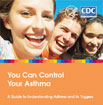Management and Treatment
On This Page

How Is Asthma Treated?
You can control your asthma and avoid an attack by taking your medicine exactly as your doctor or other medical professional tells you to do and by avoiding things that can cause an attack.
Not everyone with asthma takes the same medicine. Some medicines can be inhaled, or breathed in, and some can be taken as a pill. Asthma medicines come in two types—quick relief and long-term control. Quick-relief medicines control the symptoms of an asthma attack. If you need to use your quick-relief medicines more and more, you should visit your doctor or other medical professional to see if you need a different medicine. Long-term control medicines help you have fewer and milder attacks, but they don’t help you if you’re having an asthma attack.
Asthma medicines can have side effects, but most side effects are mild and soon go away. Ask your doctor or other medical professional about the side effects of your medicines.
The important thing to remember is that you can control your asthma. With your doctor’s or other medical professional’s help, make your own asthma action plan (management plan) so that you know what to do based on your own symptoms. Decide who should have a copy of your plan and where he or she should keep it.
You can learn more about asthma action plans from the National Heart, Lung, and Blood Institute at http://www.nhlbi.nih.gov/health/public/lung/asthma/asthma_actplan.htm. Take your long-term control medicine even when you don’t have symptoms.
The above text is from the "You Can Control Your Asthma" [PDF, 4074KB] full-color brochure and is suitable for downloading and printing.
Other Resources
American Lung Association
This site provides information about asthma management and treatment options to help you take control of your asthma. It includes facts about asthma, asthma attacks, asthma medicines, peak flow meters, and home control of allergies and asthma.
National Heart, Blood, and Lung Institute
This site provides an easy-to-read guide, So You Have Asthma, to help you learn about the latest information on asthma management and also provides facts about asthma.
- Links to non-federal organizations are provided solely as a service to our users. These links do not constitute an endorsement of these organizations or their programs by CDC or the federal government, and none should be inferred. CDC is not responsible for the content of the individual organization Web pages found at these links.
- Page last reviewed: April 24, 2009
- Page last updated: April 27, 2009
- Content source: National Center for Environmental Health
Contact Us:
- Centers for Disease Control and Prevention
1600 Clifton Rd
Atlanta, GA 30333 - 800-CDC-INFO
(800-232-4636)
TTY: (888) 232-6348
24 Hours/Every Day - cdcinfo@cdc.gov


